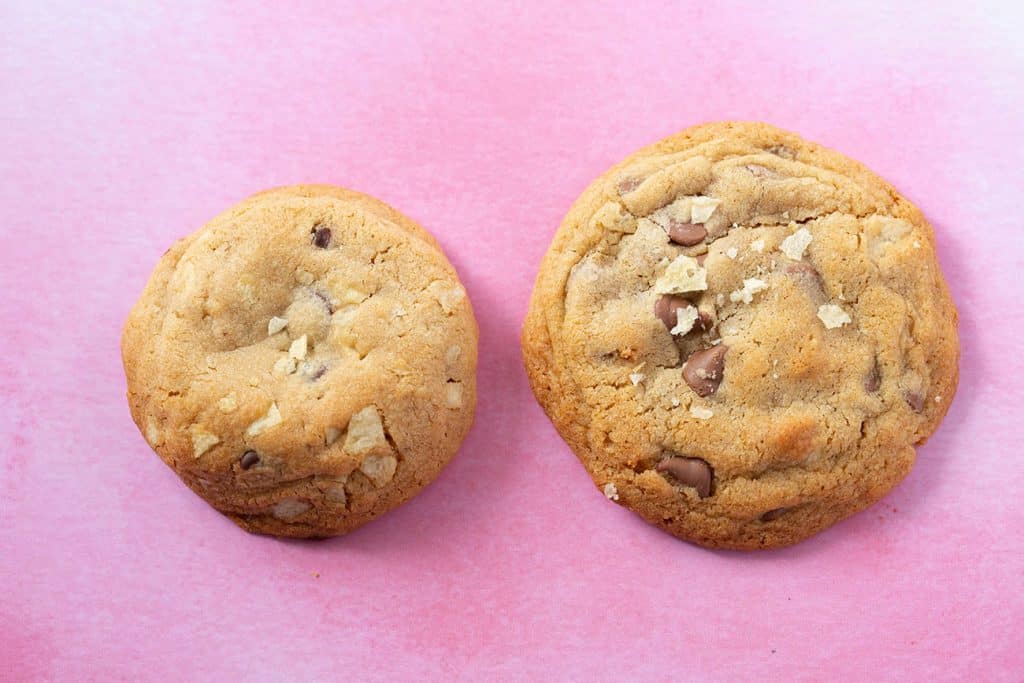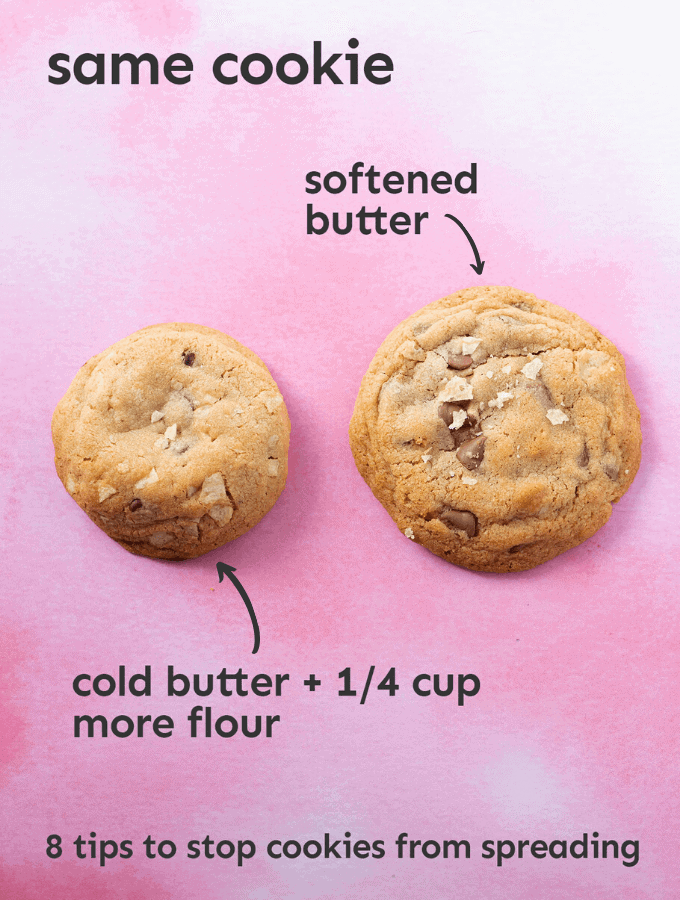Trying to make the perfect cookie?! Here are 9 reasons why your cookies are flat and spread too much in the oven.

Cookies are one of the best things to make from scratch. But despite the fact they only use a handful of regular ingredients, they can still be a little tricky to master. Over the past decade, I can’t even imagine how many cookies I’ve made – and along the way, I’ve made every mistake in the book.
- 1. Your butter was too soft
- 2. You over mixed your butter and sugar
- 3. You didn’t chill the cookie dough
- 4. You didn’t use enough flour
- 5. Your cookies have too much white sugar
- 6. Your raising agent is expired
- 7. Your oven trays are too hot
- 8. You didn’t line your cookie trays
- 9. Your oven temperature isn’t right
- Ready to bake some cookies?
I’ve had cookies that spread right across the baking tray – and ones that didn’t spread at all. And I know many of you have had the same issues. In fact, this is a question that I get asked ALOT by bakers around the world.
So let’s run through 9 common reasons why your cookies are flat.
1. Your butter was too soft
The most likely reason why your cookies spread in the oven is that your butter was too soft.
Cookies rely on the perfect ratio of butter (or fat) and flour. This ratio will help you achieve cookies that spread just the right amount in the oven.
When your cookie dough starts heating in the oven, the butter melts and causes the cookies to spread. When used in the right quantity and the right temperature, this causes your cookies to spread just the right amount.
But unfortunately, in some cases it means your cookies spread out too much and end up joining each other to form one giant cookie. Not ideal.
When a recipe calls for room temperature butter, make sure it’s just soft enough that it’ll make an ident if you poke it – it shouldn’t be squishy or melty.
If a cookie recipe calls for cold or chilled butter, use it straight from the fridge.
If a cookie recipe calls for melted butter, only then can you use butter that’s completely melted.
TEST: As an example, the image below shows two cookies. I baked them using the exact same cookie dough except for two differences. One used butter at room temperature, while the other used butter straight out of the fridge AND had 35 grams (1/4 cup) extra flour added.
Otherwise the rest of the ingredient were the same, the method was the same, neither dough was chilled and they were cooked on the same oven tray at the same temperature.

Just by altering the temperature of the butter and the slight increase in flour, you can see the first cookie spread a lot less than the second.
2. You over mixed your butter and sugar
If you’re sure you used butter at the correct temperature, you may have accidentally ‘warmed’ your butter by mixing it with an electric mixer for too long.
Many cookie recipes start by creaming together the butter and sugar – this is just to combine the ingredients.
If you do this for too long, your room temperature butter will get super warm – and then you’ll face problem 1. all over again.
Cookies are not like cake – you generally don’t need to mix them for a long time to incorporate air or completely dissolve the sugar. A quick mix of 1-2 minutes is fine.
Don’t turn your back on your butter and walk away.
3. You didn’t chill the cookie dough
Some cookie recipes will request that you chill your cookie dough. Please do it. There’s most likely a reason the recipe writer has added this step.
My Classic Chocolate Chip Cookie recipe calls for melted butter, which means you need to chill the dough. If you don’t, it’s likely your cookies will spread too much. And if they don’t, it’s likely you added too much flour.
One trick I’ve learnt over the years is to bake one tester cookie. If you’re making a new recipe, follow the instructions and then bake just one cookie. If it spreads too much in the oven, pop your cookie dough in the fridge for 30 minutes or so (even if the recipe didn’t call for it). And then try again.
4. You didn’t use enough flour
As I mentioned above, cookies rely on the right ratio of ingredients. If you didn’t add enough flour, your cookies will likely spread.
Sometimes this can be remedied by letting your cookie dough chill or next time, adding a touch more flour.
I always recommend using a kitchen scale to measure your baking ingredients, especially your flour.
Because too little flour and your cookie will spread – too much flour and your cookies will stay as balls in the oven.
If you try a recipe and it didn’t quite work for you, don’t be afraid to use these tips to adjust it so you can make the perfect cookie for you.
5. Your cookies have too much white sugar
Butter isn’t the only ingredient that helps cookies to spread in the oven. Sugar, especially white sugar, does as well.
If your cookies have a high ratio of white sugar, chances are they will spread more in the oven. I often use a mix of white and brown sugar in my cookie recipes to help with this. Sometimes I just use entirely brown sugar if I want a really thick cookie.
Alternatively, you may just need to chill your dough before baking.
6. Your raising agent is expired
If your baking soda or baking powder is expired, your cookies won’t develop as they are supposed to – causing them not to rise but simply to spread across your oven tray.
It’s a good idea to regularly replace your raising agents as they are key to baked goods rising as they should when baked.
7. Your oven trays are too hot
Have you ever preheated your oven and realised you left your oven trays in the oven? If so, don’t be tempted to use the pans and scoop out your cookie dough while they are still hot.
If you place cookie dough on oven trays that are hot, your cookie will immediately start spreading.
Always use room temperature oven trays or cookie sheets.
8. You didn’t line your cookie trays
Using spray oil or butter to grease your cookie trays will create an oily surface which will again encourage your cookie dough to spread unnecessarily.
It’s best to line your cookie trays with baking or parchment paper to help prevent your cookies from sticking and/or spreading.
9. Your oven temperature isn’t right
One of the most important aspects of baking is making sure your oven temperature is just right. If your oven is too hot or too cold, it may influence how quickly your cookies spread.
I recommend buying an oven thermometer to ensure your oven is correctly preheated to the right temperature before placing your cookies in the oven.
Ready to bake some cookies?
If you love thick and chunky cookies, try my Copycat Levain Bakery Chocolate Chip Cookies.
For soft and chewy cookies, try my Classic Chocolate Chip Cookies.





Debbie says
I have a chocolate chip cookie recipe that is scrumptious. The first time I made them they were perfect. Not to flat and not to chunky. Since then, my first two pans cooked come out flat. Then they start to not spread as much as I continue baking them. It calls for cold butter, which I use. 🤷♀️I use parchment paper as well. So ina nut shell…first half of the batch is flat and the other half isn’t.
Jessica Holmes says
Hi Debbie, that’s so strange that the cookies spread less as you bake them – often it’s the other way around because the dough has warmed. It’s also strange that there is such discrepancy in spreading when you are using the same batch of cookie dough. My only conclusion is perhaps it’s the oven? Maybe your oven runs hot and causes the butter to melt quickly and then it cools over time (as the door is open and shut?). It’s a bit of mystery!
Tammy Whaley says
My cookies look great in the oven but they spread after a few minutes of being out of the oven. What is causing this? I haven’t changed anything in the recipe and I’ve been baking these same cookies for 5 years. I am so frustrated.
Jessica Holmes says
Hi Tammy, if the cookies are spreading once they are removed from the oven, they might be deflating? That may be because there is too much air in the batter, which could come from over-mixing perhaps?
Grover says
I made two batches of the old Orange slice cookie receipt and they came out to flat did not raise at all. I lowered temp and bought new margarine and put parchment paper on the cookie sheet. and they still came out flat what do i do . Please help.
Jessica Holmes says
Hi Grover, I’m not familiar with that recipe, but perhaps a touch more flour would help? And/or you could try chilling the dough.
Cynthia says
Oh my goodness thank you, thank you! I’m trying to make some Christmas cookies that need to be shipped off tomorrow. Made two different batches with two different recipes, and both turned out flat! Now I see where I went wrong with each one, and it’s in time to save the next batch.
Jessica Holmes says
Oh I’m so glad this was helpful Cynthia! Good luck with batch three!
Tinker says
These answers to spreading chocolate cookies was excellent. I couldn’t figure out why my cookies of late have spread when they didn’t a few years ago. My oven is old, so I will double check that the temperature is correct and also I do cream the sugar and butter probably too much. Thank you for these great tips!
Jessica Holmes says
I’m so glad they were helpful Tinker!
ccxj says
hey! i have a question! whenever i use shortening in my cookies, i do get this layer of grease at the bottom of cookie dough after rolling / scooping, BUT not all of these cookies turn flat… i do freeze them before baking.
is there a reason for that grease? and is it due to shortening? or..?
many thanks 🙂
Jessica Holmes says
Hi, yes my guess is that would be the case. Shortening is 100% fat and unlike butter, it has no water content. Your cookies won’t spread as much when using shortening, but you might want to use a bit less. Since it has a different makeup and a higher fat level, you need less of it compared to butter – so not 1:1. This article has some helpful information about butter versus shortening in baking.
Michelle J says
I understand the that there are many possibilities for why cookies turn out however which way. And saying a specific why is hard to determine based on just the outcome description. What about if we describe how the cookie batter is before putting in the oven. Could that be helpful if pinpointing the “why”. I’ve been baking cookies for 30 years and when doing them from scratch I would say most of time they don’t turn out well. I am careful and observant but still can’t ever fix a bad batch.
Jessica Holmes says
Hi Michelle, yes that could be helpful. It would all depend on the recipe though, as some will result in a wet or sticky cookie dough and others more dry. It may help to find a good cookie recipe and work at it more than once. See if you notice any changes based on the temperature of your butter. Using the correct butter as required by the recipe (cold, room temperature, melted etc.) and weighing your flour for accuracy should have you most of the way there! Let me know if you want any recommendations for a specific cookie recipe to try – my Classic Chocolate Chip Cookie recipe could be a great place to start.
Carmen Boyle says
if cookies won’t spread what can you do to remedy that. It seems a same to waste all that dough. I am making toll house oatmeal scotchies. I followed directions as stated on package. Dough cam out sticky Hard to work with. I did add more flour. Instead of 11/4 cup flour I added 2. Now cookies won’t spread
Jessica Holmes says
Hey Carmen, the easiest thing to do now would be to flatten the cookies by hand before you bake them. They may not spread but if they’re flatten beforehand, they’ll hopefully still taste ok!
Patrick says
Thank you! Have been STRUGGLING with a fantastic cookie recipe and you’ve just solved the mystery of the dreaded flattening cookie! HA! Can’t wait to try it today — cookie dough: Prepare to be Chilled! 🙂
PS. The recipe I’m following indicates that the butter, sugar and eggs need to be creamed on high for a total of 10 minutes to properly emulsifiy them — I understand the science of that, but now I also understand doing that meant my butter was just too soft to cook with — I’ll bet if I look closer at my recipe, I’ll find I missed the part about chilling the dough…. ooops!
Again: THANK YOU!
Jessica Holmes says
This makes me SO happy to hear! I’m so glad it was helpful. I hope you make your perfect batch of cookies real soon! And you are absolutely right, recipes that call for a long whipping time (like Christina Tosi’s famous cookie recipes) usually require a long chill time because the butter is so soft and warm.
Mini_baker says
This helped so much! I unnecessarily used too much grease to grease a pan that didn’t need greasing!
Jessica Holmes says
Ooh so glad it was helpful!
Rosh says
Hey! Thank you for your tips! I have watched soo many videos. But no one ever broke it down so well. This is sooo helpful! 🥰
Jessica Holmes says
I’m so glad it was helpful!
Peggy Hill says
Thank you for explaining why my cookies came out flat. After I read your different reasons (which were so helpful) I believe I mixed the sugar and butter too long. I know know to bake one and if it’s flat put the dough in the refrigerator and then try again. All your suggestions are more than I’ve ever heard.
Jessica Holmes says
I’m so glad they were helpful Peggy!
Kathryn says
Hi Jess! Thank you so much for putting all of this in writing! FINALLY! Some of the mystery is clearing up for me. Sheesh! All of the good bakers in my family only have cryptic responses for my failed cookies-“You have to be careful when baking…” NOT helpful! Your post was perfect for me. I have been doing at least 4 of the items on your list. Now your list is taped to the inside of my baking cupboard, ready to guide my next cookies to greatness! Thanks again!
Jessica Holmes says
Aw I’m so happy to hear that it was helpful Kathryn! I’ve done everything on the list before too and it was wonderful to finally discover little things I could do to get great cookie results! Appreciate your lovely feedback x